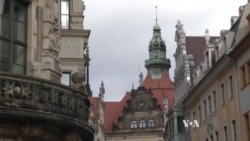The bells of Dresden's Kreuzkirche were gutted by fire in World War II and were slowly rebuilt over the following decades, like much of the rest of the city.
Dresden is now seen as the perfect example of successful German reunification. Since 1990, state support and investment have helped it blossom into a booming city of industry and culture.
"The three former East German cities of Dresden, Leipzig and Jena are a prime example of a structural transformation done well," said Dirk Hilbert, Dresden's deputy mayor.
Contrast Dresden with Dortmund, a former industrial hub in western Germany. Its unemployment rate is 12.4 percent, nearly double the national average, and the city is millions of dollars in debt.
Taxes continue
Since 1990, communities in the west have paid mandatory "solidarity fees" to help raise the former East Germany's standard of living.
But the mayor of Dortmund, Ullrich Sierau, said he couldn't explain to residents why they were continuing to pay the taxes.
“The communities here in the west have to take loans to help the communities in the east,” he said. “This is perverse. We have to contract debts in order to help cities in the east that are doing well.”
Earlier this month, Chancellor Angela Merkel, who grew up in the east, hailed the contribution the west had made to reunification. She said that thanks to the support from the western German states, the east had been able to catch up. Today, she said, the eastern states have the blooming landscapes that then-Chancellor Helmut Kohl promised at the time.
More recent geopolitical upheaval has stoked concerns over the economy.
Moscow's backing of separatist rebels in Ukraine prompted Western nations to impose sanctions on Russian individuals and businesses. The Kremlin retaliated with import restrictions. Volker Treier, chief economist at the Association of German Chambers of Commerce and Industry, said he expected a fall in exports to Russia of 20 percent.
No talk of compensation
“Especially in east Germany, we have several SME (small to medium enterprise) companies really focused on business with Russia and with Ukraine," he said. "And therefore they are really hit. But nobody speaks about compensation — although we have a political decision, but the burden is on the business.”
Treier said Germany's famous engineering and machinery sector had been hit hard. “For this sector, Russia is the fourth most important market all over the world,” he said.
Worsening East-West relations could affect Germany more than most other European countries. But analysts say the slowdown in emerging economies and the eurozone has put the brakes on the German economy — the engine of the EU economy.





